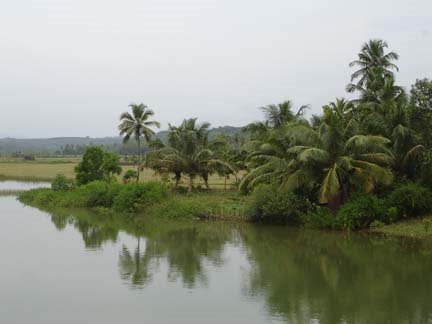Migrating tribes in the antiquity, who set out on a long trail from Africa to India, obviously with several periodic stops in between, have brought in many antique words along with them. Tulu, Bantu, Siri, Sira, Kola etc are some of the common words deduced in these blog pages to have been brought from Africa to India.
The place name ‘Manki ‘ appears t have been introduce into Karavali in the similar way, either from Papua New Guinea or from the side of Northwestern region of Indian subcontinent as discussed in the previous post.
Kenya-Kinya
One more such place name that is found in Africa as well as in Tulunadu is the word Kenya or Kinya. Kenya is a State in Africa. Kenya means the abode of Gods in African language.
We have similar sounding two places in Tulunadu that bear the name of Kinya and Kenya. In southern part of Mangalore taluk, there is one village called ‘Kinya’. And in northern part of Sullia taluk is another village called ‘Kenya’. Both these place names could be the variants of a single name Kenya. It may be recalled that the region Kenya in Africa is also pronounced as Kinya.
In the Tulu language we can somehow find meanings for both these names, but it would be neither logical nor appropriate. The word ‘Kinya’ means smaller in present Tulu. However, this meaning appears inappropriate and may not be the original meaning of the place name. Similarly, word ‘Kenya’ means ‘listen to me’ in Tulu which again is inappropriate, if not absurd, as a place name. Besides, we have analyzed in previous posts that -ya or –ia are the spatial prefixes/suffixes with (divine connotations) not only in Tulunadu (eg. Aikala, Murulia, Sullia etc) but also in Africa and Asia and Asia Minor (Arabia, Namibia, Kenya, Tunisia, Ethiopia etc).
Therefore since, -ya is a spatial suffix, Kinya and Kenya should be analyzed as
kin +ya and ken +ya.
However, the words kin and ken apparently do not have any logical meanings in present Tulu language. Therefore it is proposed that the mysterious spatial name ‘Kenya’ has been brought to Tulunadu along with immigrants in the historical past.
®
Friday, December 18, 2009
Subscribe to:
Post Comments (Atom)
Blog Archive
Books for Reference
- A Comparative Study of Tulu Dialects By Dr. Padmanabha Kekunnaya. Govinda Pai Reserach Centre, UDupi. 1994
- Koti Chennaya: Janapadiya Adhyayana. By Dr. Vamana Nandavar. Hemanshu Prakashana ,Mangalore.2001.
- Male kudiyaru. Dr B. A.Viveka Rai and D.Yadupathi Gowda, Mangalore University,1996.
- Mogaveera Samskriti By Venkataraja Punimchattaya. Karnataka Sahitya Academy.1993.
- Mugeraru:Jananga Janapada Adhyayana. By Dr Abhaya Kumar Kaukradi.Kannada & Culture Directorate,Bangalore & Karnataka Tulu Academy, Mangalore,1997.
- Puttubalakeya Pad-danagalu. Ed: Dr B.A.Viveka Rai,Yadupati Gowda and Rajashri, Sri Dharmasthala Manjunatheswara Tulu Peeta. Mangalore University.2004
- Se'erige. Ed:Dr K.Chinnapa Gowda.Madipu Prakashana,Mangalagangotri,2000.
- Studies in Tuluva History and Culture.by Dr P Gururaja Bhat (1975).Milagres College,Kallinapur,Udupi.
- Taulava Sanskriti by Dr.B.A.Viveka Rai, Sahyadri Prakashana,Mysore 1977
- TuLu naaDu-nuDi By Dr.PalthaDi Ramakrishna Achar, Puttur.
- TuLu NighanTu. (Editor in Chief: Dr U.P.Upadhyaya, Govinda Pai Research Centre,Udupi. Six volumes. 1988 to 1997
- Tulu Patero-A Philology & Grammar of Tulu Language by Budhananda Shivalli.2004.Mandira Prakashana Mangalore. p.317. (The book is in Tulu Language using Kannada script)
- TuLunadina ShasanagaLa Sanskritika Adhyayana. By Shaila T. Verma (2002) Jnanodaya Prakashana,Bangalore, p.304.(Kannada)
- Tuluvala Baliyendre. Compiled by N.A.Sheenappa Hegde,Polali,Sri Devi Prakashana,Parkala,1929/1999
* Landscape images *
A Coastal estuary

Holegadde near Honavar,Uttara Kannada dist, Karnataka
Copy? Right - but kindly remember to acknowledge!
" tulu-research.blogspot." ತುಳು ರಿಸರ್ಚ್. ಬ್ಲಾಗ್ಸ್ಪಾಟ್. ಇನ್

Have a nice day !

No comments:
Post a Comment